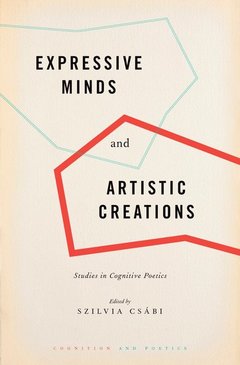Description
Expressive Minds and Artistic Creations
Studies in Cognitive Poetics
Cognition and Poetics Series
Coordinator: Csabi Szilvia
Language: English
Subjects for Expressive Minds and Artistic Creations:
Publication date: 03-2018
344 p. · 23.4x16 cm · Hardback
Out of Print
344 p. · 23.4x16 cm · Hardback
Out of Print
Description
/li>Biography
/li>
Expressive Minds and Artistic Creations: Studies in Cognitive Poetics presents multidisciplinary and interdisciplinary research papers describing new developments in the field of cognitive poetics. The articles examine the complex connections between cognition and poetics with special attention given to how people both create and interpret novel artistic works in a variety of expressive media, including literature, music, art, and multimodal artifacts. The authors have diverse disciplinary backgrounds, but all of them embrace theories and research findings from multiple perspectives, such as linguistics, psychology, literary studies, music, art, neuroscience, and media studies. Several authors explicitly discuss empirical and theoretical challenges in doing interdisciplinary work, which is often considered as essential to future progress in cognitive poetics. Scholars address many specific research questions in their articles, including most notably, the role of embodiment and simulation in human imagination, the importance of conceptual metaphors and conceptual blending processes in the creation and interpretation of literature, and the function of multiperspectivity in poetic and multimodal texts. Several new ideas are also advanced in the volume regarding the cognitive mechanisms responsible for artistic creations and understandings. The volume overall offers an expanded view of cognitive poetics research which situates the study of expressive minds within a broader range of personal, social, cultural and historical contexts. Among other leading researchers, many contributors are world-famous scholars of psychology, linguistics, and literature, including Raymond W. Gibbs, Jr., Zoltán Kövecses, and Reuven Tsur, whose defining papers also survey the roles and significance of conceptual mechanisms in literature.
Szilvia Csábi has co-authored three edited volumes and published several articles in the field of cognitive linguistics. For fifteen years she worked in Budapest at the Publisher of the Hungarian Academy of Sciences & Wolters Kluwer as managing editor of mono- and bilingual dictionaries. Currently, she works as a linguist in private industry in California.
© 2024 LAVOISIER S.A.S.
These books may interest you

Cognitive PoeticsAn Introduction 209.69 €

Cognitive PoeticsAn Introduction 68.19 €


